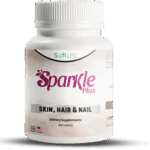Supplements for Picky Eaters: Filling the Nutritional Gaps
Picky eaters may miss out on essential nutrients like Vitamin D and calcium, which are critical for growing bones. Iron supports cognitive development, helping children reach their full potential. However, picky eating often stresses parents, placing pressure on the entire family. Psychological studies have shown that forcing children to eat healthy can do more harm than good, especially for brain development and emotional well-being. Supplements like chewable multivitamins or omega-3 gummies can support their health while working with a pediatrician and using creative recipes to incorporate vegetables into meals.
Common Nutritional Deficiencies in Kids
Here are some common deficiencies faced by picky eaters and children in general:
1.Iron: Found mainly in leafy greens and meat, iron deficiency can lead to poor concentration, fatigue, and delayed growth.
2.Calcium: Essential for bone and teeth development, children need high amounts of calcium during growth.
3.Vitamin D: While milk is a good source, limited sun exposure due to hats, sunscreen, or staying indoors can lead to Vitamin D deficiency.
4.Omega-3 Fatty Acids: Critical for brain health, omega-3s support focus and cognitive function. However, they are primarily found in fish, which most children dislike.
Kid-Friendly Supplements to Consider
If your child struggles with these deficiencies, supplements can help:
1.Chewable Multivitamins: Easy to consume and packed with essential nutrients like iron, calcium, and Vitamin D.
2.Gummies: Loved by kids for their candy-like taste, these can include omega-3s, probiotics, and other vitamins.
3.Liquid Supplements: Perfect for younger children or those who can’t swallow pills.
4.Powdered Supplements: Easy to mix into smoothies or yogurt for picky eaters.
Tips to Improve Dietary Habits
Healthy eating is essential for lifelong health. Here are some tips to help your kids develop good habits:
- Make mealtimes fun with colorful plates and foods.
- Let them choose between two healthy options.
- Incorporate vegetables into sauces, smoothies, and even baked goods using a blender.
- Lead by example by enjoying healthy foods yourself.
The Role of a Pediatrician
Regular visits to the pediatrician ensure your child receives the correct type and dosage of vitamins. Monitoring their progress can help create lasting lifestyle improvements.
Conclusion
We understand how stressful it can be to worry about your child’s diet daily. While children may not notice the impact of nutritional deficiencies, parents play a crucial role in fostering their health. Through pediatric consultations, child-friendly supplements, and creative recipes, you can make healthy eating easier for your family.
![pp[85] pp[85]](https://sofilife.net/wp-content/uploads/2025/02/pp85-1-e1739193629339.png)








